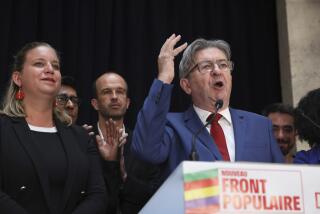Opposition Wins Seats in Tunis Vote : Elections: Parties take a legally allocated 19 slots in Assembly. President, who ran unopposed, is reelected in landslide.
- Share via
TUNIS, Tunisia — The political opposition gained a foothold in the National Assembly for the first time in this nation’s post-colonial history, as President Zine Abidine ben Ali, running unopposed, won a huge mandate for his program of economic liberalization and clamping down on Islamic fundamentalism.
Official turnout was more than 94% as 2.9 million voters went to the polls in the first election contested by opposition parties since Tunisia’s independence from France in 1956, authorities announced Monday.
Ben Ali, whose war on religious fundamentalism has left Tunisia virtually immune from the political turbulence of its North African neighbors--at the expense of thousands of arrests and restrictions on human rights--won endorsement from 99.91% of the electorate.
Parties from the political opposition took a legally allocated 19 seats in the National Assembly, their first edge into a government that has been dominated since independence by the ruling Constitutional Democratic Assembly.
The legal opposition has been less adamant than Ben Ali in making overtures to the West, expressing support for fellow Arab states Iraq and Libya in their confrontations with America and Europe.
Ben Ali has been a cornerstone of Western policy in the Middle East, presenting one of the first prospects for Arab recognition of Israel, as Tunisia has permitted Israeli officials to come and go through its capital in recent months in meetings with the Palestine Liberation Organization, headquartered in Tunis.
Tunisia hosted the first multilateral peace talks between Arab states and Israel to be held in an Arab country.
Newspapers proclaimed the elections “the Tunisian spring,” but opposition leaders branded the polling a hypocrisy since no one ran against Ben Ali, who took power from the ailing Habib Bourguiba, Tunisia’s onetime president for life, in 1987.
Moncef Marzouki, a prominent human rights activist, had announced his candidacy for the presidency but was not permitted to run under regulations, which require nomination by 30 deputies of the National Assembly or regional councils.
Ben Ali’s party until now has held all 141 seats in the National Assembly; it also controls all but one of Tunisia’s municipal councils. Marzouki had sought a delay in the elections to change the rules but did not succeed.
A second potential opponent, Abdel Rahman Hani, leader of a small nationalist party unrecognized by authorities, also announced his candidacy and challenged Ben Ali to a televised debate. But he was arrested and charged with forming an illegal association and spreading defamatory and false information.
“They can say whatever they please, but as far as we’re concerned, these elections are a disgrace to the people of Tunisia,” said Sayed Ferghani, a spokesman for the outlawed Islamic organization, Nahda, exiled in London.
Tunisian officials have deliberately opted for a cautious approach toward democratization, watching the unhappy example of neighboring Algeria, where a full-blown legalization of political parties and free elections led to a victory of Islamic fundamentalists and a subsequent military crackdown to set aside the election results, perching the country on the verge of civil war.
Meanwhile, in Egypt, the blossoming of an Islamic fundamentalist movement has resulted in numerous attacks on foreign tourists, throwing the tourism industry into chaos and raising doubts about the future course of democratic reforms.
Tunisia, despite some incidents of violence that included a purported plot to assassinate Ben Ali, has been a relative island of calm and prosperity in turbulent North Africa. It has focused on economic liberalization, tourism and agricultural development. Most citizens seem to approve of Ben Ali’s plans for development, even if the toll on human rights for the fundamentalists has been high.
Now seven years into a structural adjustment program designed to make the economy more market-oriented, growth has averaged 4.9% over the last six years and inflation is low, though unemployment stands at 13%.
More to Read
Sign up for Essential California
The most important California stories and recommendations in your inbox every morning.
You may occasionally receive promotional content from the Los Angeles Times.













